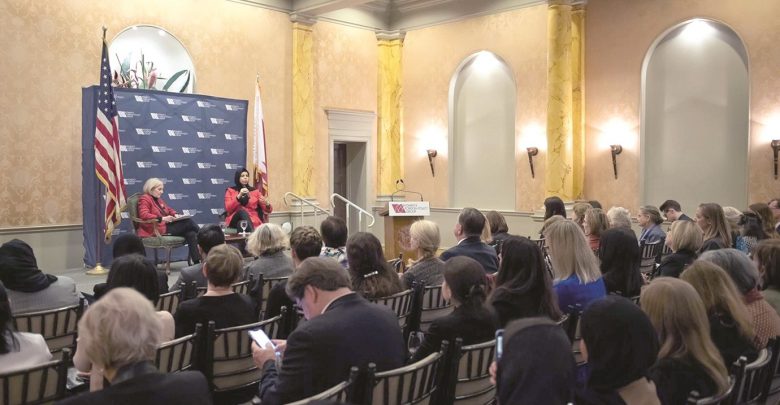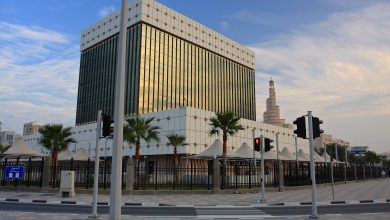
Neighbour countries are not responding to call for dialogue on Gulf Crisis
دول الجوار لا تستجيب للدعوة للحوار حول أزمة الخليج
QNA
Washington: The chances of resolving the Gulf Crisis are slim as the neighbour countries are not responding to calls for dialogue said the Spokesperson of the Ministry of Foreign Affairs Lulwah Al-Khater.
This came during the participation of the Spokesperson of the Ministry of Foreign Affairs, in a meeting of the Women’s Group for Foreign Policy in the United States.
While responding to a query on Gulf crisis, she said: “When the blockade began, many in the world thought that this was just another tribal conflict in the Arabian Peninsula, but soon they discovered that those who started the blockade of Qatar were the same cause of instability in the Arabian Peninsula,”.
She regretted the absence of prospects for resolving the Gulf crisis and said: “The chances are slim because our neighbors are not responding to calls from outside forces urging dialogue,” she said, referring to the call by many US officials for all sides to return to the negotiating table but they were not responding. “We are still open to dialogue, ” she added.
When queried about Qatar’s relationship with Iran, the official spokesperson said Iran is the only corridor to Qatar after the closure of all land and air borders with Qatar, where 90 percent of the food and medicine came through.
On Qatar World Cup 2022, the official expressed Qatar’s continued welcome for Amnesty International and Human Rights Watch, and invited human rights groups to come to Qatar to be provided with honest and transparent comments to take advantage of them including reform and improvement, noting that much had already been done.
“Qatar knows that expatriate workers represent the most vulnerable part of society,” she said, adding that “the state has changed its policies and responded to the needs of expatriate workers because these people are ultimately helping us build our country,” she said, stressing the importance of honoring and appreciating migrant workers and seeking to do more to improve their situation and accept the criticism with an open mind.
On the economic reforms in Qatar, she said that Qatar had diversified sources of supply now after the blockade and receives a lot of food supplies and other from countries such as Azerbaijan, Turkey, Australia, Africa and others. “We do not rely on one country, this the policy now,” she added.
The Spokesperson of the Ministry of Foreign Affairs reiterated Qatar’s support for the two-state solution on the 1967 borders and the right of return, and that East Jerusalem be the capital of Palestine in line with all UN resolutions and said: “The international community has agreed to these basic issues and, most importantly, is to have them implemented.”
In response to a question about the so-called in the media “deal of the century”, she said that any solution put
forward by any party must comply with international law and UN resolutions, noting that the position of the State of Qatar in this regard is no different from the United Kingdom or Germany or the European Union or most countries.
On Yemen, the Spokesperson of the Ministry of Foreign Affairs said that Qatar was part of the Arab alliance in Yemen at the beginning, on the grounds that it would be a limited operation for three weeks. “Unfortunately, the situation is catastrophic in Yemen after four years, and the humanitarian crisis outweighs anyone’s understanding. ”
She considered violent extremism a phenomenon that must be addressed at its roots and address the factors that cause it, and stressed that the solution must be comprehensive, noting that the Syrian situation requires transitional justice. “As long as Bashar is permitted to commit his heinous crimes against his people, deterioration would continue in Syria.”
She stressed the importance of a plan to resolve the Syrian crisis. “Rewarding the regime by restoring relations is certainly not a solution, and this has unfortunately begun,” she said, stressing the need to reflect on the issue and its long-term implications and that one of the most important problems that the international community has to deal with is the problem of the families of the fighters in “Daesh”, who were estimated in thousands. “Those are subject to many risks, including human trafficking and the re-exploitation of terrorist acts, in addition to the problems of poverty, lack of resources and their inability to obtain an education that can rehabilitate them as good citizens in their countries,” she said, stressing that Qatar is ready to be part of this comprehensive solution.
Read also: About 67 percent of Qatar’s higher education graduates are women: MoFA Spokersperson
لولوة الخاطر: نأسف لغياب آفاق لحل الأزمة الخليجية
أكدت سعادة السيدة لولوة الخاطر -المتحدث الرسمي لوزارة الخارجية- أن حوالي 67 % من خريجي التعليم العالي في دولة قطر من النساء.
جاء ذلك خلال مشاركة المتحدث الرسمي لوزارة الخارجية في جلسة لمجموعة المرأة للسياسات الخارجية بالولايات المتحدة الأميركية.
وجددت سعادتها موقف دولة قطر الداعم لحل الدولتين على حدود عام 1967، وضمان حق العودة، وأن تكون القدس الشرقية عاصمة لفلسطين، بما يتوافق مع قرارات الأمم المتحدة كافة، وقالت: «لقد وافق المجتمع الدولي على هذه الأمور الأساسية والأهم هو تنفيذها».
ورداً على سؤال حول ما يسمى إعلامياً بـ «صفقة القرن»، قالت إن أي حل يطرحه أي طرف يجب أن يتوافق مع القانون الدولي وقرارات الأمم المتحدة، مشيرة إلى أن موقف دولة قطر في هذا الشأن لا يختلف عن المملكة المتحدة أو ألمانيا أو الاتحاد الأوروبي أو معظم البلدان.
وأعربت المتحدث الرسمي لوزارة الخارجية عن الأسف لغياب آفاق لحل الأزمة الخليجية، وقالت: «إن الفرص ضئيلة لأن جيراننا لا يستجيبون لنداءات من قوى خارجية تحث على الحوار»، مشيرة إلى دعوة العديد من المسؤولين في الولايات المتحدة، لجميع الأطراف إلى العودة إلى طاولة المفاوضات، لكن لم يتم الرد على ذلك، وقالت: «نحن ما زلنا منفتحين على الحوار».



